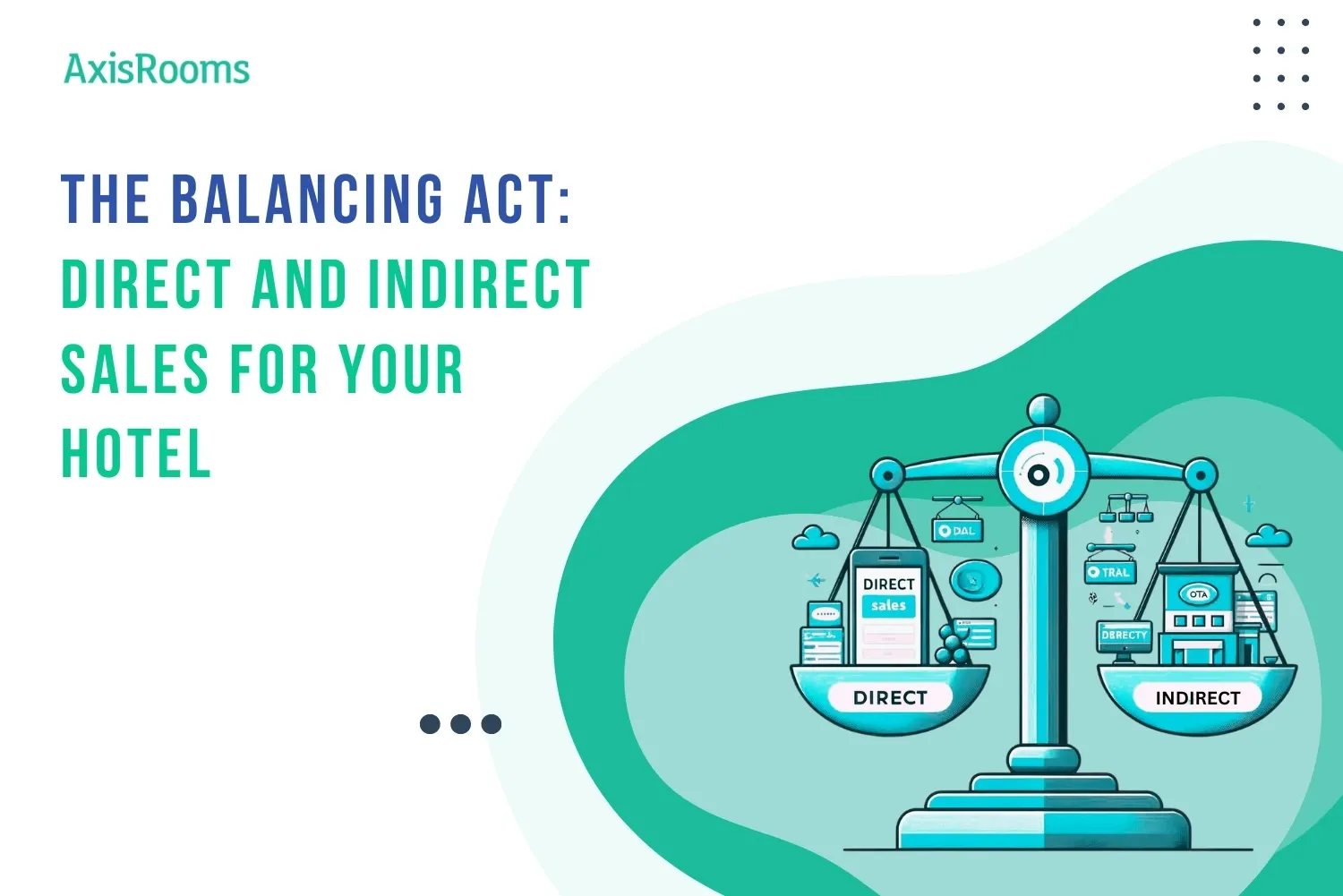The digital age has revolutionized hotel distribution strategies. While direct bookings from hotel websites strengthen relationships and save on commissions, indirect bookings via OTAs (Online Travel Agencies) expand visibility.
Relying too heavily on either stream can impact profitability and growth. The key lies in balancing both channels to increase sales, build guest loyalty, and maximize revenue. Let’s explore the advantages and challenges of each and the best practices to strike that perfect balance in 2025.
Direct vs Indirect Sales: Key Differences
- Direct Sales: Bookings made through the hotel’s official channels like its website, app, or direct calls.
- Indirect Sales: Bookings made through third-party platforms like OTAs, travel agencies, or other intermediaries.
Direct sales = higher profit margins and better guest relationships, while indirect sales = wider reach but involve commissions. Understanding their interplay is crucial for a strong distribution strategy.
Advantages and Disadvantages of Direct and Indirect Sales
Direct Sales
✅ Advantages:
- Zero or low commissions—higher profit margins.
- Better guest relationships and loyalty.
- Control over the guest booking experience.
- Reduced cancellations compared to OTA bookings.
❌ Disadvantages:
- Limited market reach without effective marketing.
- High upfront investment in SEO, website optimization, and booking engines.
Indirect Sales
✅ Advantages:
- Immediate exposure to a global audience.
- Increased bookings through OTA marketing power.
- Attracts new and diverse guests.
❌ Disadvantages:
- High commission rates reduce profit margins.
- Less control over guest communication.
- Higher likelihood of booking cancellations.
Strategies for Balancing Sales Channels
To create a strong booking strategy, you need a combination of smart tools, marketing tactics, and guest-centric practices:
Optimize Your Website for Direct Bookings
- Ensure your website is mobile-friendly, visually appealing, and easy to navigate.
- Integrate a secure and fast Booking Engine for a seamless reservation process.
- Offer direct booking incentives like:
- Complimentary breakfast
- Room upgrades
- Exclusive discounts on future stays
Use a Channel Manager for Indirect Bookings
A Channel Manager, like AxisRooms, ensures:
- Real-time rate and inventory updates across OTAs.
- Reduced risks of overbookings and rate discrepancies.
- Broader market reach without the manual effort of updating multiple platforms.
Leverage SEO and Content Marketing
- Use SEO-optimized content (blogs, videos, and social media) to attract organic traffic.
- Highlight guest experiences, hotel amenities, and unique services.
Read Also - 10 + Effective Hotel Digital Marketing Strategies
Convert OTA Guests into Direct Bookers
- Offer personalized services during their stay.
- Promote exclusive perks for direct bookings in the future.
- Use follow-up emails and SMS to maintain communication.
Analyze and Monitor Performance
Use analytics tools to measure the success of both direct and indirect sales channels:
- Which OTAs bring the most revenue?
- What promotions drive direct bookings?
- Track guest demographics and seasonal trends.
Future Trends in Hotel Distribution
Rise of Personalized Marketing
AI-powered tools will allow hoteliers to target guests with personalized offers and incentives, boosting direct bookings.
Increased OTA Dominance with Strategic Partnerships
OTAs will continue to dominate, but hotels can strike deals with platforms for favorable commission rates.
Mobile-First Booking Solutions
Guests increasingly prefer mobile-friendly booking solutions, making optimized websites and apps crucial for direct sales growth.
Dynamic Pricing
Tools like Revenue Management Systems will help hoteliers adjust room rates dynamically based on demand, driving revenue through both direct and indirect channels.
AxisRooms: Your Partner in Smart Distribution Management
- Channel Manager: Seamlessly manage your inventory and rates across OTAs in real time, reducing errors and overbookings.
- Booking Engine: Encourage direct bookings with a smooth, mobile-friendly experience integrated into your hotel website.
- Revenue Management System: Optimize room pricing to stay competitive while maximizing profits.
- Performance Analytics: Monitor sales data across channels to make informed decisions for future growth.
By leveraging AxisRooms’ smart solutions, you can:
- Maximize your property’s reach.
- Improve operational efficiency.
- Increase both direct and indirect bookings while maintaining profitability.
Conclusion
Balancing direct and indirect sales is the key to long-term success for your hotel. Direct bookings improve profit margins and guest loyalty, while OTAs boost exposure and attract new customers.
By combining smart tools, optimized strategies, and guest-centric solutions, you can strike the perfect balance to grow your revenue and future-proof your hotel business.
Ready to transform your hotel’s distribution strategy? Explore how AxisRooms can help you manage and optimize bookings effortlessly.


